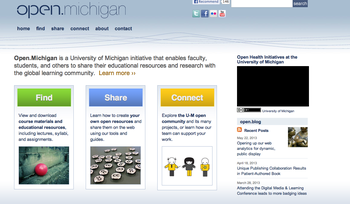High cost of textbooks has local colleges moving toward alternatives
Textbooks aren't cheap, and they're a tacked-on cost for students attending local colleges who already bear the burden of rising tuition costs.
University of Michigan cautions students to put aside $1,050 a year for the cost of textbooks and materials, and warns that the cost could be higher for certain programs like architecture and art. Washtenaw Community College offers full-time students on scholarship roughly $1,200 for books and supplies. Eastern Michigan University suggests $1,000 a year for books.

Local schools are considering alternatives to textbooks.
Associated Press
A growing number of colleges are considering ways to leverage open educational resources (OERs) — online reading and educational material offered to students for free or at a reduced cost during the course of a class — so students can forgo textbooks for certain classes.
For example, WCC will offer two classes next semester with readings available online for free instead of textbooks with high price tags. The courses — one reading course and one math course — typically have high enrollment and high textbook costs.
The offerings are part of the Kaleidoscope Project, a grant-based initiative funded by Next Generation Learning Challenges. At least 14 colleges participate in the program, which requires colleges to track the success rate of courses that use the open material against the success rate of similar courses that use traditional textbooks. Participating students also are surveyed on how they liked the use of a free, online material versus a traditional book.

The Washtenaw Community College President Rose Bellanca speaks in the Morris Lawrence building on Tuesday, May 14.
Daniel Brenner I AnnArbor.com
The cost of textbooks can keep students from buying them on time, or sometimes at all, which can mean falling behind in class. At a school like WCC, where many students have limited resources, this can be a debilitating issue.
"We have faculty commenting that students are electing in many cases to not buy the textbooks or they keep putting it off and putting it off," said Linda Blakey, WCC's vice president for student and academic services. "Textbook costs have just kind of skyrocketed."
With students opting out of buying books, success rates suffer. If learning material is made available for free, "the premise would be that there'd be higher success rates," Blakey said.
The online free material is compiled and authored by faculty throughout the country and it can be tweaked and expanded upon by the professors who want to customize the material for a course.

WCC's campus.
Meanwhile, U-M has been operating vast online library of sorts —chuck full of textbooks, classroom lectures and even educational slides— that professors can use in lieu of traditional textbooks.
This free library is available online and its materials can be modified by anyone using them. It's called Open Michigan, and the idea is that educators can point students to educational material and it doesn't cost a dime. The content on Open Michigan is licensed so that it's publicly available and adaptable, but the original content is still copyrighted to the author.
The open platform has allowed U-M to put foreign subtitles on lecture videos. Entire textbooks are available on the platform for free— one textbook was created and modified by students during an engineering course.
"We can only do this because the content is open, because we have the ability to adapt these things," says Pieter Kleymeer, a U-M staffer that's worked on Open Michigan since it was first established 5 years ago. "That's really the key here, otherwise it's just locked in a vault, essentially, and it never comes out."
Kleymeer says more professors catch on to OERs each year. Over the past five years, Open Michigan has had roughly 300,000 unique visitors, with about 75,000 them visiting for the first time in the last five months.
Kleymeer says some professors are taking material from courses they've taught during the bulk of their careers and creating their own, free textbooks online. Such endeavors are easier with static subjects, like statistics or philosophy. With fields like medicine and engineering, which are constantly adapting, scholars are still learning how to adapt OERs.

A screenshot of Open Michigan's webpage.
"We're definitely in the midst of a transition," said Nicole Allen, an affordable textbook advocate at Student Public Interest Research Groups. "It's obvious that it's going to go in the direction of digital, although perhaps not as fast as students originally thought."
Allen's organization estimates 3,000 professors throughout the country use open educational resources in lieu of textbooks. The number of free, quality resources remains small compared to the number of textbooks available, but it's growing at an increasing rate.
As other open education platforms grow in popularity, including Coursera —which has seen an explosion of growth— OERs are also growing in popularity and practicality.
WCC anticipates continuing with the Kaleidoscope program after the fall 2013 semester. As the Kaleidoscope Project expands its portfolio, member institutions will be able to offer more classes free of textbooks.
Rhonda Longworth, EMU's associate provost for academic programming, says professors at the Ypsilanti school are gradually beginning to recognize the benefits of OERs.
"I would say they're probably not [used by] a majority yet," she said. "I think you're going to seem them used more often... it's increasing every semester."
Longworth said that with increasing frequency students have been requesting course materials come in an electronic form.
"Students are a huge driver in this," she said. "This is a different generation of students. "Their interest in having mobile electronic devices that give them mobility in the way they access their resources is huge."
Kellie Woodhouse covers higher education for AnnArbor.com. Reach her at kelliewoodhouse@annarbor.com or 734-623-4602 and follow her on twitter.


Comments
Dick Hercher
Thu, May 30, 2013 : 6:18 p.m.
We are publishing affordable books -not free-for some markets. Ours are $116 for students--or $70 for an E-book. The top three sellers in one of these markets are now $263, $255, $244.90. Our new books cost less than an unbound version of the bestsellers, less than a used copy, in some cases, even less than a rental fee. They do cost money, and there really is no free lunch, but our intent is to provide high quality texts that are affordable.
you can't handle the truth
Thu, May 30, 2013 : 5:14 p.m.
Liberals run colleges and universities. No wonder costs are out of control.
Edward R Murrow's Ghost
Fri, May 31, 2013 : 12:30 p.m.
What do Colleges and Universities have to do with the prices that publishers charge the bookstores? What do Colleges and Universities have to do with the prices that bookstores charge students? The only valid point your post makes is that conservatives will blame liberals for everything and anything, no matter how illogical, no matter the complete lack of facts. GN&GL
JRW
Thu, May 30, 2013 : 5:03 p.m.
The textbook industry is gouging students big time with their one sentence changes from year to year that demand a "new edition" be purchased every year. It's ludicrous and serves only the huge publishers, not the students. It's a huge rip off and any alternative to these parasites is welcome. $150 for a textbook? Get real.
crinnin
Fri, May 31, 2013 : 12:39 a.m.
You have no idea what is takes to produce a new edition. No publisher would change one sentence and put out a new edition. It makes no economic sense. Publishers can't afford to engage in such nonsense.
jeffindex
Thu, May 30, 2013 : 3:50 p.m.
There are actually legitimate reasons why textbooks cost what they do. Did you make any attempt to contact someone from the publishing industry to get those reasons? How about the markup by the bookstores? Costs of limited run publishing? Associated online and test banks provided? Etc., Etc., Etc. This article seems pretty biased to me.
Kellie Woodhouse
Thu, May 30, 2013 : 4:05 p.m.
Hi there! I've spoken with folks from the textbook industry in previous reporting. This article isn't so much about the debate on textbook costs, but more on alternatives schools are exploring. Specifically the focus here is OERs, and the idea for the story was sparked by the WCC program mentioned near the top. But I expanded the scope of the article to include other local schools. Michigan, in particular, has been exploring OERS for a number of years-- and not just to save money but to promote open access for access sake. Email me if you have further ideas on the textbook/educational materials topic. -Kellie
jondhall
Thu, May 30, 2013 : 3:06 p.m.
Absolutely great article You should teach a class to your fellow reporters!! Lots of details and facts .
TB
Thu, May 30, 2013 : 2:58 p.m.
I think the expensive textbooks is a professor-driven phenomenon. Many professors have either written or have a friend/colleague who has written a textbook on the subject they teach. You can add a lot of money to your professor salary if you write your own textbook and require all your students to purchase it and come out with a new version every year so they can't be reused.
TB
Mon, Jun 3, 2013 : 3:57 p.m.
@crinnin, Obviously this doesn't apply to all textbooks/professors/authors/courses. when I talked about professors getting extra money, I meant from the sales of the books, not tenure. Many new editions come out every year without any/much meaningful added material, just corrected typos and an occasional "_______ today" box with a recent news story on the topic. Unless you are teaching a very obscure class, you can likely find a textbook that covers your course material without having to write your own.
crinnin
Fri, May 31, 2013 : 12:38 a.m.
Not so. Do you know what it takes to write a textbook? Most professors would rather do anything but engage in this activity. Textbooks are not recognized as scholarly works and count to nothing in tenure decisions. It is also not true that a new edition of all books comes out each year. Textbook writing is such a time consuming activity that it is not possible to come out with a new edition each year.
A2comments
Thu, May 30, 2013 : 8:50 p.m.
Bingo
Ricebrnr
Thu, May 30, 2013 : 2:55 p.m.
Per usual on AA.com. A little knowledge is a thing that must be brandished willy-nilly. Re: Open textbooks. http://net.educause.edu/ir/library/pdf/eli7070.pdf 5. What are the downsides? The traditional publishing model features robust editorial and distribution mechanisms designed to ensure the quality and availability of printed textbooks. Open textbook publishing currently lacks this structure, raising legitimate concerns about the accuracy and reliability of the content. Without the imprimatur of a traditional publishing company, an open text may seem to be missing an essential credential that speaks to its validity. This places an extra burden on the instructor to ensure an open text is complete, accurate, and appropriate for student needs. Authors may be reluctant to embark on textbook creation without the backing of a publisher that not only provides support in the form of editors, illustrators, and compensation but also undertakes specialty tasks such as troubleshooting copyright issues that surround the various intellectual property components found in a text. In everyday use, open textbooks might also present new concerns: where such texts are required during a lecture or discussion, students must have in class computer access, an e-reader, or a printed copy of the material. The widespread adoption of open textbooks might have an impact on the economic model of traditional campus bookstores. Are textbooks too expensive? Perhaps. But the work in creating the content, let alone the infrastructure to distribute that content has a cost. Even open and "free" texts cost something to create and host. As they say there is no free lunch. Now how about someone not just gripe about costs but intelligently and with expertise discuss the publisher's pricing models and where/how they can reduce prices?
Ricebrnr
Thu, May 30, 2013 : 6:02 p.m.
Ms. Woodhouse, While I frequently (and justly) question the quality of reporting on this site, in this case my ire was directed at the ill informed commentors, but since you're on the subject yes your article deserves some attention as well. Others have commented on the bias inherent in your article. The reason for this is the vacuum you left on the downsides of OER as well as WHY if it's so great there is not more of it. Reporting is supposed to be fair and balanced. You can't do that by presenting only half the story. I'll leave to others to decide if that bias is intentional or... To help you in your further research, see these: http://edcetera.rafter.com/flat-world-knowledge-moves-from-free-to-paid-access/ http://www.insidehighered.com/news/2012/11/05/flat-worlds-shift-gears-and-what-it-means-open-textbook-publishing http://www.inc.com/magazine/201302/april-joyner/case-study-iffy-business-models.html You might also want to look into a hometown company that is attempting to bridge the gap between expensive textbooks and the needs of both instructors and students. http://www.xanedu.com/our-purpose/lower-the-cost-of-education/
Kellie Woodhouse
Thu, May 30, 2013 : 4:11 p.m.
Hi there. Sorry you feel that way about our coverage. I know OERs are still limited in their capacity and that quality can be tricky. Programs like Kaleidoscope are looking to increase the quality of widely spread OERS. For certain subjects that don't change much, like math or perhaps history and some english literature, OERs make a lot of sense. For others that are changing and expanding and growing, like engineering and medicine, there's more difficulty producing OERs and maintaining quality. That's one reason U-M encourages its own trusted faculty to produce free textbooks for such classes, but of course such options aren't always viable. I talked to people who think that Textbooks can't necessarily be replaced entirely, nor should they, but their use can be supplemented by other materials such OERs.
djacks24
Thu, May 30, 2013 : 1:50 p.m.
""Students are a huge driver in this," she said. "This is a different generation of students. "Their interest in having mobile electronic devices that give them mobility in the way they access their resources is huge."" Of course students are a huge driver of this. Because the students (and parents) have always been on the losing end of the college text book racket. The push has been going on for years since personal computers and portable document format has been available. It's just the fact that the colleges and publishers can no longer make excuses for not making this information available in cheaper formats.
catfishrisin
Thu, May 30, 2013 : 1:18 p.m.
An older edition of the same text is pretty cheap on Amazon. Hardly any significant changes.
Ricebrnr
Thu, May 30, 2013 : 7:30 p.m.
"Sure, but most professors want you to have an up to date version. Can't tell you how many times in college that was emphasized to me by professors. It's always been a racket." Rather sweeping statement, based on? Most professors hate switching to new editions because that requires them to review adn revamp syllabi they would otherwise use over and over.
aggatt
Thu, May 30, 2013 : 4:29 p.m.
that's what I always bought. It was never a problem because I never had a professor assign homework from a book, that seems very high-schooly to me. It was always more of a reference. Plus the library has several copies of every required textbook that you can use whenever you want.
beardown
Thu, May 30, 2013 : 3:03 p.m.
The difference is usually in the questions at the end of most science or math books. Very little of the content changes from edition to edition, but if you want to do the homework, you kinda need to have the right questions.
djacks24
Thu, May 30, 2013 : 1:45 p.m.
Sure, but most professors want you to have an up to date version. Can't tell you how many times in college that was emphasized to me by professors. It's always been a racket.
crinnin
Thu, May 30, 2013 : 12:14 p.m.
Is it the cost of textbooks that is the real problem here or the cost of tuition, room, and board? Lower tuition so that students can afford the books they need.
crinnin
Fri, May 31, 2013 : 12:33 a.m.
Students can sell their books back at the end of the term. They are not obligated to keep them and most opt to sell them.
beardown
Thu, May 30, 2013 : 3:02 p.m.
While the cost for tuition, et al. is a problem, making a student buy a couple hundred dollars in books for each class is a back breaker. So students take out more student loans to cover the costs of their books and their debt rises. All for a degree that is now the equivalent of what a high school diploma used to be.
djacks24
Thu, May 30, 2013 : 1:43 p.m.
The publishing companies have had a lock on college text books for the past 30 years. There is no reason the same information can't be available digitally in .pdf form or otherwise. Then, when there is a new revision of the same book for changing a sentence or two and another $120 for a new revision. It makes most sense to start with books and it should have started years ago.
Ponycar
Thu, May 30, 2013 : 1:40 p.m.
So what you're saying is, paying over $1,000/year for textbooks isn't really a problem?
Nick Danger
Thu, May 30, 2013 : 11:57 a.m.
I quit using the recommended text for my class years ago. I converted to free online information for my students. $120.00 for the text was absurd
beardown
Thu, May 30, 2013 : 3 p.m.
I've been a professor for five years now and I have yet to require my students to buy a single book. For most non science courses, most everything a student needs can be found on the free web.
djacks24
Thu, May 30, 2013 : 1:39 p.m.
Wish all my professors in college were like you...